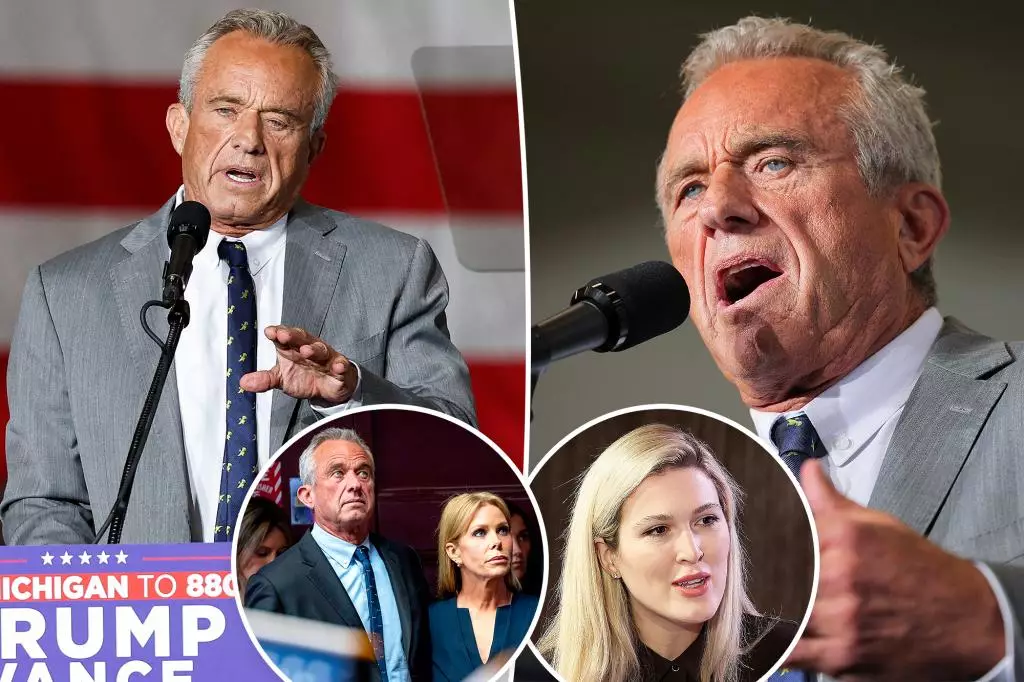In a world where public scrutiny often governs the perceptions of politicians, Robert F. Kennedy Jr. finds himself navigating a challenging moment in his career. The recent sexting scandal with New York Magazine writer Olivia Nuzzi has placed him firmly in the spotlight, yet he displayed an air of composure and authority as he participated in a Senate roundtable discussion on nutrition. This juxtaposition of personal and professional turmoil raises intriguing questions about the lives of public figures and their capacity to forge ahead amidst controversy.
The Panel Discussion: Addressing Fundamental Health Issues
During the Senate roundtable, entitled “American Health and Nutrition: A Second Opinion,” Kennedy stood alongside notable figures including fitness expert Jillian Michaels and prominent psychologist Dr. Jordan B. Peterson. The gathering, led by Wisconsin Senator Ron Johnson, aimed to discuss pressing health concerns in America, particularly the pervasive influence of corporate interests on dietary regulations and public health policy. Despite the negative attention surrounding his personal life, attendees remarked on Kennedy’s apparent ease and engagement during the discussion, with one observer noted saying, “He seemed great to me!”
The dynamic nature of the panel underscored the multifaceted challenges facing American health. With speakers such as Max Lugavere, Calley Means, and Vani Hari, the conversation ventured into serious criticisms of how corporate entities capture regulatory organizations like the FDA and USDA, compromising the nation’s health in the process. This fervent dialogue not only resonated with advocates for nutritional reform but also positioned Kennedy as a compelling figure in the quest for genuine systemic healthcare improvements.
While Kennedy’s professional demeanor at the panel was commendable, questions linger about how his alleged scandal affects his public image and future prospects. At 70 years of age, Kennedy has long been a vocal critic of the food industry, arguing that the standard American diet is laden with ultra-processed foods and harmful additives. Yet, such public revelations inevitably complicate his narrative, leading to skepticism among constituents who might waver in their support due to personal failings.
In an era where character matters significantly to political identity, Kennedy’s scandal invites a broader inquiry into how personal mistakes can overshadow professional advocacy. Despite the gravity of his alleged actions with Nuzzi, he has made it clear that he prefers to redirect discussions toward health and policy rather than delve into his private life. When pressed about the sexting affair, Kennedy’s refusal to comment further encapsulates his desire to shift the narrative back to substantive issues that profoundly impact public wellbeing.
Kennedy’s alignment with Donald Trump and his bold statements urging for substantial reform in public health reflect his ambition to assume a significant role in the political landscape. His remarks on the need for a president who prioritizes America’s health resonate amid increasing public awareness about the consequences of diet and environmental toxins. His assertions on government corruption, particularly within the USDA and FDA, paint a picture of an industry rife with complications, positioning him not just as a politician but as a whistleblower of sorts seeking to expose deeper systemic flaws.
Whether Kennedy’s controversial commentary will elevate his political career or further alienate constituents remains uncertain. However, his ability to speak candidly about the state of American health, even when tempered by personal challenges, illustrates a remarkable resilience. It raises the underlying theme that truth in public life often oscillates between personal integrity and professional imperatives.
As Robert F. Kennedy Jr. moves forward amid public distraction and personal scandal, his narrative serves as a potent reminder of the complexities inherent in political life. The alignment of personal actions with professional advocacy is tenuous, and yet, Kennedy’s resolve to confront important topics regarding American health remains unwavering. How the public will perceive his dual existence as both a potential cabinet member and embroiled in scandal is yet to be determined. Ultimately, he embodies a fascinating case study in how the emotional and ethical dimensions of public life often collide, shaping perceptions and futures in unpredictable ways.

